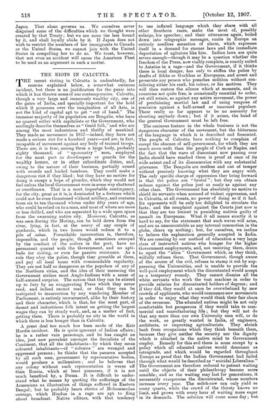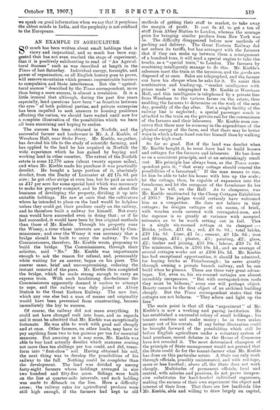THE RIOTS IN CALCUTTA. T HE recent rioting in Calcutta is
undoubtedly, for reasons explained below, a somewhat ominous incident, but there is no justification for the panic into which it has thrown some of our contemporaries. Calcutta, though a very large and immensely wealthy city, one of the gates of -India, and specially important for the hold which it possesses over the imagination of all Asia, is not the kind of capital apt to get " out of hand." The immense majority of its population are Bengalis, who have no quarrel either with capitalists or the Government, who smilingly describe themselves as " timid folk," and who are among the most industrious and thrifty of mankind. They made no movement in 1857—indeed, they have not made a serious riot for a hundred years—and are, in fact, incapable of movement against any body of trained troops. There are, it is true, among them a large body, probably eighty thousand, of " up-country " men, employed for the most part as doorkeepers or guards for the wealthy houses, or in other subordinate duties, and, owing to the nature of their business, partially armed with swords and loaded bamboos. They could make a dangerous riot if they liked ; but they have no motive for doing it except a hope of plunder, which they would not feel unless the local Government were in some way shattered or overthrown. That is a most improbable contingency, for the city, great as it is, is dominated by a fortress which could not be even threatened without artillery, and contains from six to ten thousand whites under fifty years of age, who could be relied on to a mau, and most of whom are more or less drilled, and who are separated by a wide open space from the swarming native city. Moreover, Calcutta, as was seen during the Mutiny, can be held down from the river, lying, in fact, at the mercy of any couple of gunboats, which in two hours would reduce it to a pile of ashes. Formidable insurrection is, therefore, impossible, and the people, though sometimes annoyed by the conduct of the sailors in the port, have no permanent quarrel with the Government, and no apti- tude for rioting, or even for passive resistance. As a rule they obey the police, though they grumble at them, and pay all local taxes with commendable regularity. They are not half so dangerous as the populace of any of the Northern cities, and the idea of their menacing the Government strikes most Anglo-Indians with a sense of half-amused surprise. The notion that they can be stirred up to fury by an exaggerating Press which they never read, and indeed cannot read, or that they can be instigated to insurrection by any wandering Member of Parliament, is entirely unwarranted, alike by their history and their character, which is that, for the most part, of decent and industrious folk intent on getting the largest wages they can by steady work, and, as a matter of fact, getting them. There is probably no city in the world in which there is less hunger than in Calcutta.
A great deal too much has been made of the Xeir Hardie incident. He is quite ignorant of Indian affairs ; he is a rather vain personage, and he has caught an idea, just now prevalent amongst the Socialists of the Continent, that all the inhabitants—by which they mean coloured inhabitants—of " colonies " are wronged and oppressed persons ; he thinks that the panacea accepted by all such men, government by representative bodies, would produce a millennium ; and he believes that any colony without such representation is worse off than Russia, which at least possesses, if it is not much benefited by, a Duma. It is difficult to under- stand what he means by quoting the sufferings of the Armenians as illustration of things suffered in Eastern Bengal ; but he probably hears stories of Mohammedan outrage, which Hindus in a rage are apt to fling about broadcast. Native editors, with that tendency to use inflated language which they share with all other Southern races, make the most of, possibly enlarge, his speeches ; and their utterances again, boiled down into telegraphic messages, excite in Europe an entirely needless sensation of alarm, which expresses itself in a demand for sterner laws and the immediate . deportation of agitators like him. Indian laws are quite severe enough—though it may be a question whether the freedom of the Press, now visibly complete, is exactly suited to Asiatics in a rage—and the Government, if it thinks there is local danger, has only to stiffen the police by drafts of Sikhs or Gurkhas or Europeans, and arrest and prosecute any person who preaches sedition without con- sidering either his rank, his colour, or his motives. They will then restore the silence which at moments, and in countries not quite free, is occasionally essential to order, yet still retain, as against any active movement, the power of proclaiming martial law and of using weapons of precision against a half-armed or unarmed populace. There really so far appears to be no necessity for shooting anybody down ; but if it arises, the hand of the general Government must be left free.
The ominous feature in the whole business is not the dangerous character of the movement, but the bitterness of the language in which it is described and fomented. The people of Calcutta have nothing to complain of except the absence of self-government, for which they are much more unfit than the people of Cork or Naples, and the fact that the wave of discontent now passing over India should have reached them is proof at once of its wide extent and of its disconnexion with any substantial grievance. The Bengalis are restless and out of temper without precisely knowing what they are angry with. The only specific charge of oppression they bring forward is that the police are " brutal "; but they can obtain redress against the police just as easily as against any other class. The Government has absolutely no motive to shield its servants when accused of violent oppression, and in Calcutta, at all events, no power of doing so if it had. Its opponents will be only too delighted to circulate the facts ; and the complaint against the Courts just now is that they are too lenient in punishing natives guilty of assault on Europeans. What it all means exactly it is hard to say, for the statement that such waves will arise, and are as unaccountable as any internal commotion in the globe, clears up nothing ; but, for ourselves, we incline to believe the explanation generally accepted in India. We are creating by our method of education a very large class of instructed natives who hunger for the higher Government employments, and, not receiving them, desire to upset the " alien " Government which, as they think, wilfully refuses them. That Government, though aware of the source of the evil, refuses to stamp it out by sup- pressing the Universities, and is unable to provide the well-paid employment which the discontented would accept as a temporary remedy. They cannot dismiss all the white servants who work the vast machine in order to provide salaries for discontented holders of degrees ; and if they did, they would at once be overwhelmed by new crowds of applicants, who would commence new movements in order to enjoy what they would think their fair share of the revenues. The educated natives might be not only comfortable but prosperous if they would take to com- mercial and manufacturing life ; but they will not do that any more than our own University men will, or do the work, so greatly wanted in India, of engineers, architects, or improving agriculturists. They shrink back from occupations which they think beneath them, because they give neither the security nor the dignity which is attached in the native mind to Government employ. Remedy for this evil there is none except by a policy which all educated natives would denounce as retrograde, and which would be regarded throughout Europe as proof that the Indian Government had failed through what would be described as " suicidal Liberalism." The Government are therefore reduced to patient waiting until the objects of their philanthropy become more sensible ; and as the waiting may last for generations, it necessarily exasperates the discontented, whose numbers increase every year. The milch-cow can only yield so many quarts, while the crowd of the thirsty knows lie limit, and grows with every hour of waiting more eager in its demands. The solution will come some day ; but we speak on good information when we say that it perplexes the ablest minds in India, and the perplexity is not confined to the Europeans.











































 Previous page
Previous page